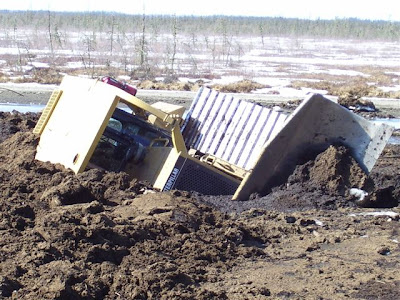ha
You didn't know there was tests on here did you?
Anyone know what Muskeg is?
well according to wikipedia Muskeg is:
Hmmm sounds like a text book, pretty boringMuskeg is more-or-less synonymous with bogland but muskeg is the
standard term in non-Atlantic Canada and Alaska (while bog is more common
elsewhere). The term is of Cree origin, maskek
meaning low lying marsh. Large tracts of this soil existing in Siberia may be
called muskeg or bogland interchangeably. Muskeg consists of dead plants in
various states of decomposition (as peat), ranging from
fairly intact sphagnum moss, to sedge peat, to highly
decomposed muck. Pieces of wood such as buried tree branches
can make up five to 15 percent of the peat soil. Muskeg tends to have a water
table very near the surface. As well, the sphagnum moss forming it can
hold 15 to 30 times its own weight in water, allowing the spongy wet muskeg to
form even on sloping ground
But the Muskeg freezes solid in the winter and can be driven on.
I bring this up because Chris is working up in Fort McMurray right now. He called last night and told me they site they are working on is Muskeg. They have been told that the trucks must be started and moved every ten minutes. Because within an hour your tires can sink 2 -3 inches and once that happens the truck will be unmovable and completely stuck. and worst case scenario???......

source: D6 Caterpillar that broke through muskeg in spring thaw. Located near Wabasca, Alberta.
again according to wikipedia:
During the 1870s, muskeg in Northern Ontario was reported to have swallowed a railroad engine whole when a track was laid on muskeg instead of clearing down to bedrock. Many other instances have been reported of heavy construction equipment vanishing into muskeg in the spring as the frozen muskeg beneath the vehicle thawed.





No comments:
Post a Comment